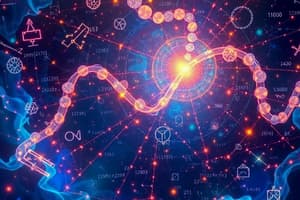Podcast
Questions and Answers
What is mathematics primarily concerned with?
What is mathematics primarily concerned with?
- The study of historical events and cultures
- The study of literature and languages
- The study of quantity, structure, space, and change (correct)
- The study of living organisms and their environments
What do mathematicians use to verify conjectures?
What do mathematicians use to verify conjectures?
- Guesswork
- Personal opinions
- Mathematical proofs (correct)
- Statistical surveys
Which field commonly uses mathematics as an essential tool?
Which field commonly uses mathematics as an essential tool?
- Culinary arts
- Natural science (correct)
- Creative writing
- Film production
What is the study of numbers and operations between them called?
What is the study of numbers and operations between them called?
What area of mathematics involves the study of continuous change?
What area of mathematics involves the study of continuous change?
Which of the following is NOT a common mathematical symbol?
Which of the following is NOT a common mathematical symbol?
What constitutes mathematical language?
What constitutes mathematical language?
What is the primary focus of pure mathematics?
What is the primary focus of pure mathematics?
What does applied mathematics primarily aim to do?
What does applied mathematics primarily aim to do?
What is the purpose of mathematical modeling?
What is the purpose of mathematical modeling?
Flashcards
What is Mathematics?
What is Mathematics?
The study of topics such as quantity, structure, space, and change.
What is Applied Mathematics?
What is Applied Mathematics?
The use of mathematical tools to solve problems in science, engineering, and other fields.
What is Arithmetic?
What is Arithmetic?
The study of numbers and operations between them.
What is Algebra?
What is Algebra?
Signup and view all the flashcards
What is Calculus?
What is Calculus?
Signup and view all the flashcards
What is Geometry?
What is Geometry?
Signup and view all the flashcards
What is Trigonometry?
What is Trigonometry?
Signup and view all the flashcards
What is Statistics?
What is Statistics?
Signup and view all the flashcards
What is a Mathematical Proof?
What is a Mathematical Proof?
Signup and view all the flashcards
What is Mathematical Notation?
What is Mathematical Notation?
Signup and view all the flashcards
Study Notes
- Mathematics involves studying quantity, structure, space, and change.
- The precise scope and definition of mathematics are subject to varying views among mathematicians and philosophers.
- Mathematics involves the identification of patterns and the creation of new conjectures.
- Mathematicians verify or disprove conjectures through mathematical proofs, which are convincing arguments.
- Mathematical research is essential for addressing and resolving mathematical problems.
- Mathematics is a globally utilized tool in fields like natural science, engineering, medicine, finance, and social sciences.
- Applied mathematics uses mathematical tools to tackle problems in various fields like natural science.
- Mathematics is employed in modeling natural phenomena, providing insights into nature.
- Mathematical sciences primarily focus on the study of mathematics itself.
- Arithmetic focuses on numbers and the operations performed on them.
- Algebra involves generalizing arithmetic operations and solving equations.
- Calculus studies continuous change, including limits, derivatives, integrals, and functions.
- Geometry is the study of the shapes, sizes, and positions of figures.
- Trigonometry studies the relationships between the sides and angles of triangles.
- Statistics is the study of data collection, analysis, interpretation, presentation, and organization.
- Probability studies the likelihood of events occurring.
- Logic studies valid reasoning and argumentation.
- Set theory studies collections of objects.
- Number theory studies the properties of integers.
- Topology studies shapes and spaces that remain unchanged under continuous deformations.
- Discrete mathematics studies mathematical structures that are fundamentally discrete rather than continuous.
- Mathematical analysis deals with continuous functions, limits, and related theories.
- Numerical analysis studies algorithms for approximating solutions to mathematical problems.
- Optimization focuses on identifying the best possible solution to a problem.
- Mathematical modeling translates real-world problems into mathematical formulations for analysis.
- Mathematical models of real-world phenomena can be developed using mathematics.
- Insights and predictions about the real world can be derived by solving mathematical models.
- A mathematical proof provides a logical argument for a mathematical statement.
- Proofs can include axioms, assumptions, previously proven statements, or basic rules of inference.
- Proofs exemplify exhaustive deductive reasoning establishing logical certainty.
- Mathematical notation uses symbols to represent mathematical objects and ideas.
- Besides mathematics, notation is used in science and engineering.
- Common math symbols include +, -, ×, ÷, =, ≠, <, >, ≤, ≥.
- Notation has varied across cultures and time periods.
- Standard notations have been essential for the progress of mathematics.
- Mathematical language is used by mathematicians to share mathematical ideas.
- Mathematical language uses a natural language (like English) with technical terms and grammatical conventions specific to mathematics.
- Mathematical language relies on specialized terminology.
- Mathematical language is precise and unambiguous in its communication.
- Pure mathematics studies mathematical concepts for their intrinsic value.
- Intellectual curiosity drives pure mathematics.
- Applied mathematics uses mathematical tools to solve real-world problems.
- Sciences and engineering use applied mathematics.
- Applied mathematics is the origin of many mathematical branches.
- The history of mathematics spans thousands of years.
- Ancient civilizations, including Egyptians, Babylonians, Greeks, Indians, and Chinese, significantly contributed to mathematics.
- The development of algebra, calculus, and other mathematical branches occurred over centuries.
- Mathematics is an active area of ongoing research.
- Mathematicians continue to discover new mathematical ideas.
- Mathematics is often used in education.
- Schools and universities worldwide teach mathematics.
- A solid foundation in mathematics is crucial for success in various fields.
- Math competitions are popular among students.
- Students are challenged to solve mathematical problems in competitions.
- Competitions help develop problem-solving skills.
- Mathematics is connected to science, engineering, and computer science.
- Mathematical methods are applied in physics, chemistry, biology, and other sciences.
- Many engineering disciplines rely on mathematics.
- Algorithms and data structures in computer science use mathematics.
- Mathematical software performs calculations and simulations.
- Mathematicians and scientists use these tools to solve complex problems.
- New mathematical research is published in mathematical journals.
- Mathematicians use journals to share their findings.
- Finance uses mathematics to model financial markets and manage risk.
- Financial mathematics applies mathematical methods to financial problems.
- Encoding and decoding messages in cryptography uses mathematics.
- Secure communication relies on mathematical algorithms in cryptography.
- Statistics uses mathematics for data collection, analysis, and interpretation.
- Statistical methods are applied in medicine, business, and government.
- Analyzing strategic interactions in game theory relies on mathematics.
- Economics and political science use game theory.
- Mathematics is used in operations research to optimize decision-making.
- Logistics and transportation use operations research techniques.
- Developing intelligent systems in artificial intelligence uses mathematics.
- Machine learning algorithms rely on math concepts.
- A framework for understanding the world is provided by mathematics.
- Critical thinking skills can be enhanced through mathematical thinking.
- Studying mathematics can be challenging but rewarding.
Studying That Suits You
Use AI to generate personalized quizzes and flashcards to suit your learning preferences.




